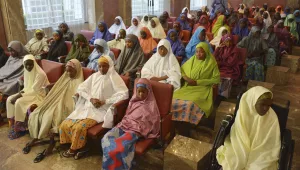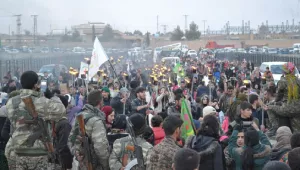BOSTON -- Why did the Islamic Cultural Center -- planned to be built in Lower Manhattan, a few blocks from the former World Trade Center site -- elicit such strong sentiments throughout the United States for and against it about a month ago? That controversy has dampened down considerably now, but the gyrating nature of the controversy tells us much about its real nature and dimensions, beyond an Islamic cultural center in lower Manhattan.
It seems to me that the underlying tensions that surfaced last month relate to two issues that become volatile when they are combined - the crazily polarized nature of American politics, and the country's continuing crisis about almost every aspect of the Sept. 11 terror attacks. Nine years later, two things remain abundantly clear. First, Muslims in the United States are well integrated and accepted and have tremendous opportunities for both self-improvement and contributing their share of national development. "Islam in America," as the phrase is often used in the United States, is not a substantive problem or issue among the mainstream of society. This is because the vast majority of Americans are benevolent, tolerant people who understand that integrating immigrants remains both a central tenet of what defines this country, and is also a source of constant renewal and national dynamism. Also, this is a nation of laws that protect personal liberties and equal opportunities above all else, which is the main reason immigrants keep arriving here.
Second, though, the United States still seems confused, traumatized and angered by the 9/11 attacks and all that they represent. That combination is why we have witnessed a combination of sensible and slightly crazed reactions to 9/11, which persist to this day.
Three very different reactions can now be ascertained in hindsight:
• The US government moved quickly and forcefully to wage war in Afghanistan and Iraq, with very mixed results in terms of reducing terror threats around the world -- witness this week's heightened terror alert in Europe, for example.
• Much of the public reacted in the traditional, sensible American manner of trying to learn more about the terrorist movements that attacked them, and also to explore and understand the Islamic faith in broader terms. It is a well-intentioned but problematic trend, though, because Americans do not study Christianity to understand why American terrorists killed abortion doctors, do not study Judaism to learn about the Israeli terrorists who attack and kill Palestinians, and do not study Buddhism to learn why Buddhist monks demonstrate for political rights in the streets of Myanmar now and then. In other words, terrorism by Muslims is linked in the mainstream American mind with a need to understand the Islamic religion while this association is not made in the case of other faiths' political or criminal behavior.
• Some political movements and personalities exploited the angry and vengeful public mood to single out "Islamic extremism" as the great threat that faces American values and interests today.
In the past year or so, some rightwing American politicians have intensified the scare-talk about immigrants and Muslims transforming, even "taking over," America. When this converged with the 9/11 anniversary and the mid-term elections throughout the United States in the past month, the crazies took over the public sphere and used the Islamic center project as a target that brought together all the fears and the lingering ignorance about the Al-Qaeda terrorists that together keep "Islamic extremism" a live political issue in the US. To their credit, the American people in their hearts remain mostly tolerant and inclusive, not seeing "Islam" as any sort of threat or problem and pretty evenly split on the appropriateness of building the Islamic center in lower Manhattan.
The center itself is planned as a 16-floor complex that will include a sports, fitness and swimming center, a child care and playground area, exhibition space and auditorium, a restaurant, and prayer space. Many prominent Americans, including the president and the mayor of New York, have spoken out forcefully in favor of the center and the ecumenical spirit of shared values with other religions that it represents. The building design that was revealed last week -- very futuristic and looking more like a Nordic modern design center than an Islamic mosque -- seems to have helped dampen the controversy, which is also due to the politicians actually focusing on the real issues the voters care about in the November election.
It is important to analyze issues like the Islamic center controversy for what they really represent, rather than for how they are facilely represented in the mass media at a moment of current electoral frenzy and lingering trauma and confusion about past terror attacks. On that basis, the people and political culture of the United States broadly get high marks, notwithstanding the deliberate and reckless provocations of a band of crazies.
Rami G. Khouri is Editor-at-large of The Daily Star, and Director of the Issam Fares Institute for Public Policy and International Affairs at the American University of Beirut, in Beirut, Lebanon.
Khouri, Rami. “Behind the Islamic Center Controversy.” Agence Global, October 6, 2010





